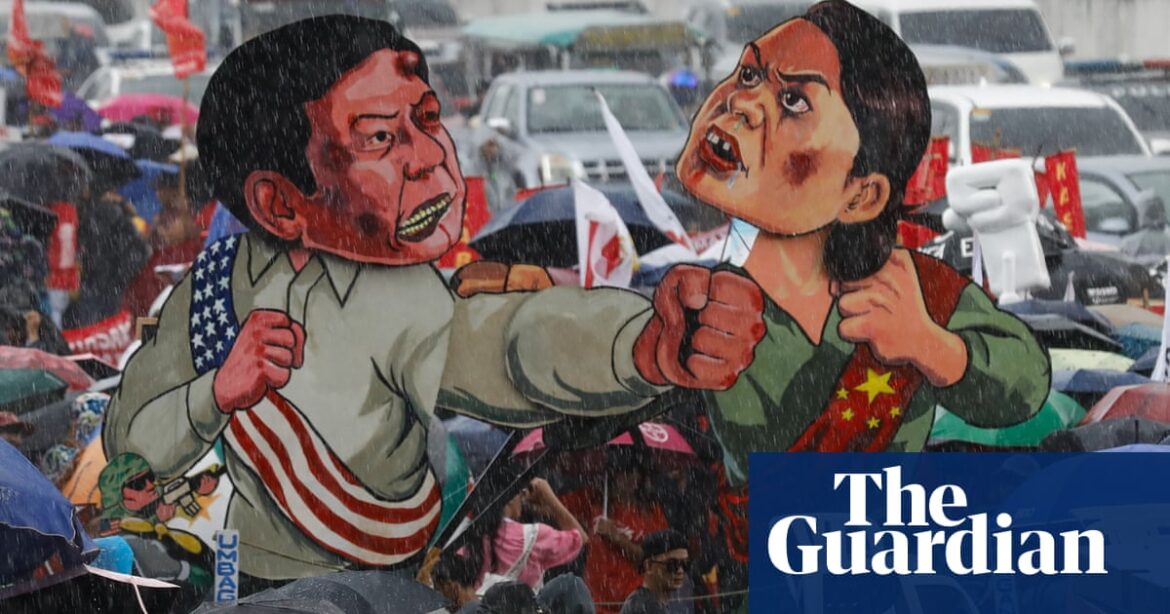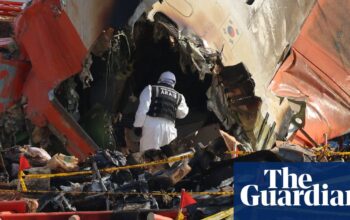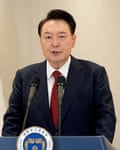
Former Philippine president Rodrigo Duterte, 79, returned to politics this week when he registered to run as mayor in his family’s stronghold, Davao city. It leaves little doubt: two of the country’s most powerful political families, the Dutertes and the Marcoses, are set for an epic struggle for power.
For the Dutertes, it could prove a battle for their survival. Rodrigo Duterte is facing an investigation by the international criminal court for crimes against humanity over his brutal war on drugs, and the family needs political clout and powerful friends.
Next year’s midterm elections, in which thousands of regional and city seats are to be contested, as well as 317 Congress seats and, importantly, 12 senate positions, will prove a broader test of the family’s relevance. They are facing a challenge from an upstart dynasty in their stronghold, Davao, which analysts say marks the most significant threat to their power there in two decades, and are battling against the formidable resources and machinery of President Ferdinand Marcos Jr on the national stage.
For Marcos Jr, son and namesake of the late dictator Ferdinand Marcos Sr, midterm elections next year will be crucial to cementing his legacy before he reaches the end of his single six-year term limit.
Both families are already eyeing the 2028 presidential election, a vote that could have major implications for the country’s foreign policy, which under Marcos Jr has become far more closely aligned with the US. Relations with Washington and Beijing are just one of the many issues over which Marcos Jr and his predecessor differ.
A veneer of unity
Just a couple of years ago the Marcos and Duterte were supposed to be allies. Marcos Jr won a thumping victory in 2022 after running in a joint campaign with the now vice-president Sara Duterte, the daughter of the former president.
Her father, who remained highly popular even after reaching the end of his term limit, had always been unhappy with her decision to ally with the Marcoses rather than seek the top job herself, however.
The veneer of unity did not last long. Criticisms and colourful tirades have erupted several times. One year into the alliance, Sara Duterte drew attention when, in a cryptic remark, she appeared to call Marcos Jr’s cousin and speaker of the house of representatives, Martin Romualdez, “tambaloslos” – a Visayan mythical creature, known from its enlarged mouth and genitals, which has a reputation for leading people astray. The insults and criticisms mounted. Earlier this year Rodrigo Duterte, in an expletive-laden comments, accused his successor Marcos Jr of being a drug addict who was seeking to remove constitutional term limits so his family could cling to power.
By June, Sara Duterte had resigned as education minister. Since then, she has criticised Marcos Jr’s response to floods in her home town Davao, and the way in which a police manhunt sought the now detained pastor Apollo Quiboloy, who is accused of child abuse and human trafficking, saying police displayed “gross abuse of power”. The vice-president even turned up to address Quiboloy’s followers during a police manhunt, and apologised to them for her past campaigning for Marcos Jr.
Quiboloy, an ally of Rodrigo Duterte, and a politically influential religious leader whose sect claims millions of followers, also registered this week to run for the senate election, despite being in prison.
The Dutertes will hope their allies secure as many seats as possible in the influential senate, where 12 of 24 spots are available. Their presence could offer some level of insulation against legal threats, including from the ICC.
“[They could say if] you allow him to get arrested, you won’t get my vote on key legislation that you want passed,” said Aries Arugay, a visiting senior fellow at the ISEAS-Yusof Ishak Institute.
Marcos Jr had previously said he will not cooperate with the ICC’s investigation into Duterte’s anti-drugs crackdowns in which between 12,000 and 30,000 civilians are estimated to have been killed.
It is becoming more likely that Marcos Jr might change his stance, said Prof Maria Ela L Atienza, who teaches political science at the University of the Philippines.
“It’s now very obvious that there’s no longer unity,” she said. Cooperating with the ICC could be risky for Marcos Jr, but she added, this will “depend on how the public views Duterte and whether he’s still relevant and popular.”
Sara Duterte’s approval and trust ratings have dipped over recent months after her resignation from Marcos Jr’s cabinet – but she continues to score higher than the president, with support especially high in Mindanao.
Regardless, analysts caution they cannot be complacent even in their own stronghold. This week a candidate from a rival dynasty, the Nograles, registered to run against Rodrigo Duterte for the mayoral spot, while another family member registered to run against his son, Paolo Duterte who is seeking re-election to congress. It is the first time in two decades the Dutertes have faced a real contenders in Davao, said Arugay.
“They can mount a serious challenge. And if the Marcos Jr. administration will really pour resources [in through] money politics – no bailiwick is safe from that,” Arugay said.
If successful, the Marcos family could “further isolate Sara Duterte, to the point that she’s the only Duterte that holds political office,” he added.
Source: theguardian.com



